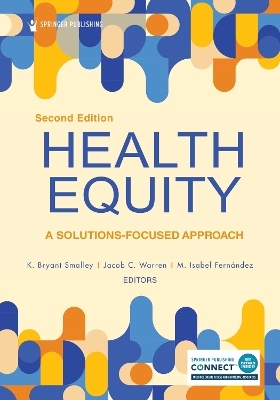
Health Equity
Springer Publishing Co Inc (Verlag)
978-0-8261-4951-0 (ISBN)
- Noch nicht erschienen (ca. Dezember 2024)
- Versandkostenfrei innerhalb Deutschlands
- Auch auf Rechnung
- Verfügbarkeit in der Filiale vor Ort prüfen
- Artikel merken
This 2nd edition features new and expanded coverage on global health equity, populations experiencing homelessness, inequities in immigrant and refugee populations, lessons learned about health equity from the COVID-19 pandemic, and much more. It presents promising programs for achieving health equity in specific populations, and thoughtfully explains points of intersectionality that can produce unique lived experiences with associated inequities. Chapters are authored or co-authored by members of the community being discussed, providing relevant and authentic perspectives to current and future challenges. Purchase includes online access via most mobile devices or computers.
Key Features:
NEW Chapters and Expanded Coverage — Includes new chapters on global health equity and populations experiencing homelessness, and significantly updated content on cultural humility and health equity in African-American, American Indian and Alaska Native, immigrant, and refugee populations
Diverse Population Coverage — Provides historical context, sociocultural dynamics, and population-specific evidence-based programs from the voices of the communities being discussed
Lessons Learned from Current Events — Presents and discusses examples related to health equity challenges and solutions found in the news and related to disparities and inequities measured in the pandemic
Origins and Theories — Discusses the sociocultural and political origins of health disparities and the major theories that underlie an understanding of health equity
Solutions-Focused — Describes emerging models and gives best practices in designing new programs
Intersectionality Spotlights — Highlight the role that overlapping and interdependent identities play in promoting health equity and the interventions they inspire
Case Studies and Real-World Examples — Demonstrate how to apply health equity improvement approaches in different contexts
Instructor's Packet — Qualified instructors have access to expanded Instructor Resources featuring chapter PowerPoints, Test banks, an Instructor Manual with learning activities and discussion questions for each chapter, a Sample Syllabus, and additional resources to supplement students' dynamic learning and interaction with the text
K. Bryant Smalley, PhD, PsyD, MBA, is a licensed clinical psychologist and health equity researcher. He serves as the Associate Vice President for Research, the Wyoming Excellence Chair in Rural Health, and the Co-Executive Director of the Wyoming Rural Health Institute at the University of Wyoming, where he is also a Professor of Public Health. Jacob C. Warren, PhD, MBA, CRA, is a behavioral epidemiologist specializing in health equity research. He serves as the Co-Executive Director of the Wyoming Rural Health Institute and Professor of Public Health at the University of Wyoming. María Isabel Fernández, PhD, is a community psychologist whose health equity work focuses on substance abuse and HIV prevention and treatment in African-American and Hispanic populations. She is Professor Emeritus at the Kiran Patel College of Osteopathic Medicine at Nova Southeastern University (NSU).
Contributors
Preface
SECTION I. INTRODUCTION AND OVERVIEW
Chapter 1. Health Equity: Essential Concepts and Origins of the Field
Chapter 2. Prejudice, Discrimination, and Health
Chapter 3. Health Equity Frameworks and Theories
Chapter 4. Health Equity Research and Collaboration Approaches: CBPR, Mixed Methodologies, and Collective Impact
Chapter 5. The Role of Cultural Competence, Cultural Humility, and Structural Competence in Achieving Health Equity
SECTION II. POPULATION PERSPECTIVES ON HEALTH EQUITY
Chapter 6. Achieving Health Equity in the African American Community
Chapter 7. Health Equity in US Latinx Populations
Chapter 8. Asian American Health Equity
Chapter 9. American Indian and Alaska Native Health Equity
Chapter 10. Accelerating Health Equity for Kānaka ‘Ōiwi, the Indigenous People of Hawaiʻi
Chapter 11. Women's Health Equity
Chapter 12. LGBTQ+ Health Equity
Chapter 13. Rural, Frontier, and Appalachian Health Equity
Chapter 14. Health Equity in Immigrant and Refugee Populations
Chapter 15. Addressing Health Equity in People Experiencing Homelessness
Chapter 16. Health Equity in Veteran Populations
Chapter 17. Health Equity in Populations with Disabilities
Chapter 18. Achieving Health Equity for Children
Chapter 19. Addressing Global Health Inequities
SECTION III. THE PATH FORWARD
Chapter 20. The Future of Health Equity
Index
| Erscheint lt. Verlag | 28.12.2024 |
|---|---|
| Zusatzinfo | 27 Illustrations |
| Verlagsort | New York |
| Sprache | englisch |
| Maße | 178 x 254 mm |
| Themenwelt | Studium ► Querschnittsbereiche ► Prävention / Gesundheitsförderung |
| ISBN-10 | 0-8261-4951-0 / 0826149510 |
| ISBN-13 | 978-0-8261-4951-0 / 9780826149510 |
| Zustand | Neuware |
| Haben Sie eine Frage zum Produkt? |
aus dem Bereich


